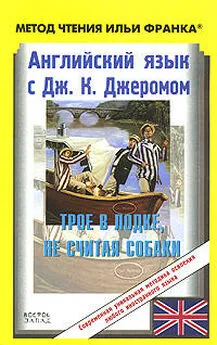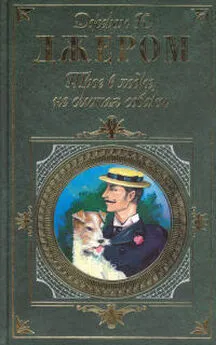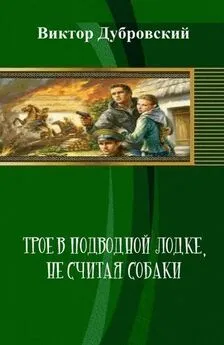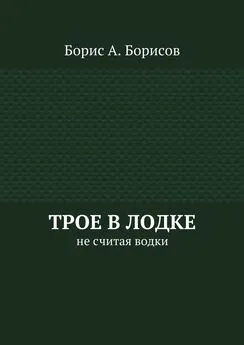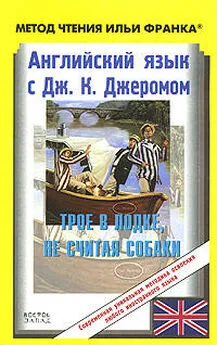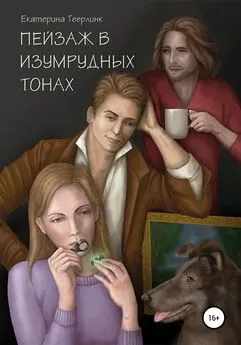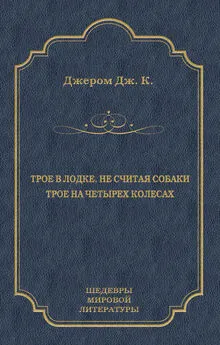Jerome Jerome - Английский язык с Джеромом К. Джеромом. Трое в лодке, не считая собаки (ASCII-IPA)
- Название:Английский язык с Джеромом К. Джеромом. Трое в лодке, не считая собаки (ASCII-IPA)
- Автор:
- Жанр:
- Издательство:неизвестно
- Год:неизвестен
- ISBN:нет данных
- Рейтинг:
- Избранное:Добавить в избранное
-
Отзывы:
-
Ваша оценка:
Jerome Jerome - Английский язык с Джеромом К. Джеромом. Трое в лодке, не считая собаки (ASCII-IPA) краткое содержание
Jerome K. Jerome. Three Men in a Boat (To Say Nonthing Of The Dog)
Джером К. Джером. Трое в лодке, не считая собаки
Текст адаптирован (без упрощения текста оригинала) по методу Ильи Франка: текст разбит на небольшие отрывки, каждый и который повторяется дважды: сначала идет английский текст с «подсказками» — с вкрапленным в него дословным русским переводом и лексико-грамматическим комментарием (то есть адаптированный), а затем — тот же текст, но уже неадаптированный, без подсказок.
Начинающие осваивать английский язык могут при этом читать сначала отрывок текста с подсказками, а затем тот же отрывок — без подсказок. Вы как бы учитесь плавать: сначала плывете с доской, потом без доски. Совершенствующие свой английский могут поступать наоборот: читать текст без подсказок, по мере необходимости подглядывая в подсказки.
Запоминание слов и выражений происходит при этом за счет их повторяемости, без зубрежки.
Кроме того, читатель привыкает к логике английского языка, начинает его «чувствовать».
Этот метод избавляет вас от стресса первого этапа освоения языка — от механического поиска каждого слова в словаре и от бесплодного гадания, что же все-таки значит фраза, все слова из которой вы уже нашли.
Пособие способствует эффективному освоению языка, может служить дополнением к учебникам по грамматике или к основным занятиям. Предназначено для студентов, для изучающих английский язык самостоятельно, а также для всех интересующихся английской культурой.
Мультиязыковой проект Ильи Франка: www.franklang.ru
От редактора fb2. Есть два способа оформления транскрипции: UTF-LATIN и ASCII-IPA. Для корректного отображения UTF-LATIN необходимы полноценные юникодные шрифты, например, DejaVu или Arial Unicode MS. Если по каким либо причинам вас это не устраивает, то воспользуйтесь ASCII-IPA версией той же самой книги (отличается только кодированием транскрипции). Но это сопряженно с небольшими трудностями восприятия на начальном этапе. Более подробно об ASCII-IPA читайте в Интернете:
http://alt-usage-english.org/ipa/ascii_ipa_combined.shtml
http://en.wikipedia.org/wiki/Kirshenbaum
Английский язык с Джеромом К. Джеромом. Трое в лодке, не считая собаки (ASCII-IPA) - читать онлайн бесплатно полную версию (весь текст целиком)
Интервал:
Закладка:
And then he would lift up the picture, and drop it (потом он поднимает картину и роняет ее) , and it would come out of the frame (она вылетает из рамы) , and he would try to save the glass, and cut himself (он пытается спасти стекло и режется) ; and then he would spring round the room, looking for his handkerchief (затем он скачет по комнате, ища свой носовой платок; to spring — пружинить; прыгать, скакать) . He could not find his handkerchief, because it was in the pocket of the coat he had taken off (он не может найти свой носовой платок, потому что он в кармане пиджака, /который/ он снял; to take off) , and he did not know where he had put the coat (он не знает, куда положил пиджак) , and all the house had to leave off looking for his tools, and start looking for his coat (и всему дому приходится перестать искать его инструменты и начать искать пиджак; to leave off — прекращать делать что-либо; бросать привычку) ; while he would dance round and hinder them (в то время как он /дядя/ пляшет вокруг = по комнате и мешает им; to dance — танцевать; прыгать, скакать) .
picture ['pIktS@] handkerchief ['h&Nk@tSIf]
"Now you go and get me my hammer, Will," he would shout; "and you bring me the rule, Tom; and I shall want the step-ladder, and I had better have a kitchen-chair, too; and, Jim! you run round to Mr. Goggles, and tell him, `Pa's kind regards, and hopes his leg's better; and will he lend him his spirit-level?' And don't you go, Maria, because I shall want somebody to hold me the light; and when the girl comes back, she must go out again for a bit of picture-cord; and Tom! — where's Tom? — Tom, you come here; I shall want you to hand me up the picture."
And then he would lift up the picture, and drop it, and it would come out of the frame, and he would try to save the glass, and cut himself; and then he would spring round the room, looking for his handkerchief. He could not find his handkerchief, because it was in the pocket of the coat he had taken off, and he did not know where he had put the coat, and all the house had to leave off looking for his tools, and start looking for his coat; while he would dance round and hinder them.
"Doesn't anybody in the whole house know where my coat is (неужели никто во всем доме не знает, где мой пиджак) ? I never came across such a set in all my life (я никогда не встречал таких людей за всю мою жизнь; to come across — /случайно/ встретиться, натолкнуться на; set — набор, комплект; семейство; группа людей /связанных общими интересами, привычками и т.д./) — upon my word I didn't (честное слово, /не встречал/) . Six of you! — and you can't find a coat that I put down not five minutes ago (вас шестеро — и вы не можете найти пиджак, который я снял пять минут назад; to put down — класть, опускать) ! Well, of all the — (эх, видел я…; of all the — видел я таких…) "
Then he'd get up, and find that he had been sitting on it, and would call out (затем он поднимается и обнаруживает, что сидел на нем, и кричит) :
"Oh, you can give it up (можете перестать /искать/) ! I've found it myself now (я уже нашел его сам) . Might just as well ask the cat to find anything as expect you people to find it (/я/ мог бы с таким же успехом попросить кошку найти что-нибудь, чем ожидать, что вы, люди, найдете это) ."
And, when half an hour had been spent in tying up his finger (и, когда полчаса потратили, перевязывая ему палец; to spend; to tie up — перевязывать, привязывать, связывать) , and a new glass had been got (новое/другое стекло достали; to get) , and the tools (инструменты) , and the ladder (лестницу) , and the chair (стул) , and the candle had been brought (и свечу принесли; to bring) , he would have another go (он делает еще одну попытку) , the whole family, including the girl and the charwoman (вся семья, включая горничную и поденщицу; charwoman — поденщица для домашней работы; уборщица) , standing round in a semi-circle, ready to help (становится рядом полукругом, готовая помочь) . Two people would have to hold the chair (двоим приходится держать стул) , and a third would help him up on it, and hold him there (третий помогает ему /дяде/ взобраться на него и поддерживает его) , and a fourth would hand him a nail (четвертый подает ему гвоздь) , and a fifth would pass him up the hammer (пятый подает ему молоток) , and he would take hold of the nail, and drop it (а дядя хватает гвоздь и роняет его) .
glass [glA:s] charwoman ['tSA:,wum@n] fourth [fO:T]
"Doesn't anybody in the whole house know where my coat is? I never came across such a set in all my life — upon my word I didn't. Six of you! — and you can't find a coat that I put down not five minutes ago! Well, of all the — "
Then he'd get up, and find that he had been sitting on it, and would call out:
"Oh, you can give it up! I've found it myself now. Might just as well ask the cat to find anything as expect you people to find it."
And, when half an hour had been spent in tying up his finger, and a new glass had been got, and the tools, and the ladder, and the chair, and the candle had been brought, he would have another go, the whole family, including the girl and the charwoman, standing round in a semi-circle, ready to help. Two people would have to hold the chair, and a third would help him up on it, and hold him there, and a fourth would hand him a nail, and a fifth would pass him up the hammer, and he would take hold of the nail, and drop it.
"There (ну вот) !" he would say, in an injured tone (говорит он обиженным тоном; injured — обиженный, оскорбленный; поврежденный, раненый) , "now the nail's gone (теперь гвоздь пропал) ."
And we would all have to go down on our knees and grovel for it (и нам всем приходится опуститься на колени и ползать, /чтобы найти/ его; to grovel — лежать ниц; ползать) , while he would stand on the chair, and grunt (пока он стоит на стуле и ворчит; to grunt — хрюкать; ворчать, бормотать) , and want to know if he was to be kept there all the evening (и спрашивает: «хочет знать», не придется ли ему торчать там весь вечер; to keep — держать) .
The nail would be found at last (гвоздь находится, наконец) , but by that time he would have lost the hammer (но к этому времени он потерял молоток; to lose) .
"Where's the hammer (где молоток) ? What did I do with the hammer (что я сделал с молотком = куда девал молоток) ? Great heavens (о Господи; heaven — небеса, небо; Боже) ! Seven of you, gaping round there, and you don't know what I did with the hammer (вас семеро, /стоите/ тут, глазеете и не знаете, куда я девал молоток; to gape — зевать; глазеть; зиять) !"
injured ['IndZ@d] knee [ni:]
"There!" he would say, in an injured tone, "now the nail's gone."
And we would all have to go down on our knees and grovel for it, while he would stand on the chair, and grunt, and want to know if he was to be kept there all the evening.
The nail would be found at last, but by that time he would have lost the hammer.
"Where's the hammer? What did I do with the hammer? Great heavens! Seven of you, gaping round there, and you don't know what I did with the hammer!"
We would find the hammer for him (мы находим молоток для него) , and then he would have lost sight of the mark he had made on the wall (и потом он потерял отметку, /которую/ сделал на стене; to lose sight of — потерять из виду; забыть) , where the nail was to go in (куда гвоздь должен был войти) , and each of us had to get up on the chair, beside him, and see if we could find it (и каждому из нас /по очереди/ пришлось встать на стул рядом с ним и посмотреть = попытаться найти ее) ; and we would each discover it in a different place (и каждый обнаруживает ее в другом месте) , and he would call us all fools, one after another, and tell us to get down (и он называет нас всех дураками, одного за другим, и говорит нам слезть) . And he would take the rule, and re-measure (и он берет линейку, и мерит снова) , and find that he wanted half thirty-one and three-eighths inches from the corner (и обнаруживает, что ему нужна половина = нужно разделить пополам тридцать один и три восьмых дюйма от угла; inch — дюйм /2, 54 см/) , and would try to do it in his head, and go mad (и пытается сделать это в голове, и сходит с ума = бесится) .
And we would all try to do it in our heads (и мы все пытаемся сделать это в своих головах) , and all arrive at different results (и все приходим к различным результатам) , and sneer at one another (и издеваемся друг над другом; to sneer at — насмехаться, глумиться над) . And in the general row, the original number would be forgotten (и во всеобщем споре первоначальное число забывается; row — перебранка, ссора; to forget) , and Uncle Podger would have to measure it again (и дяде Поджеру приходится мерить снова) .
discover [dIs'kVv@] measure ['meZ@] original [@'rIdZInl]
We would find the hammer for him, and then he would have lost sight of the mark he had made on the wall, where the nail was to go in, and each of us had to get up on the chair, beside him, and see if we could find it; and we would each discover it in a different place, and he would call us all fools, one after another, and tell us to get down. And he would take the rule, and re-measure, and find that he wanted half thirty-one and three-eighths inches from the corner, and would try to do it in his head, and go mad.
Читать дальшеИнтервал:
Закладка:
